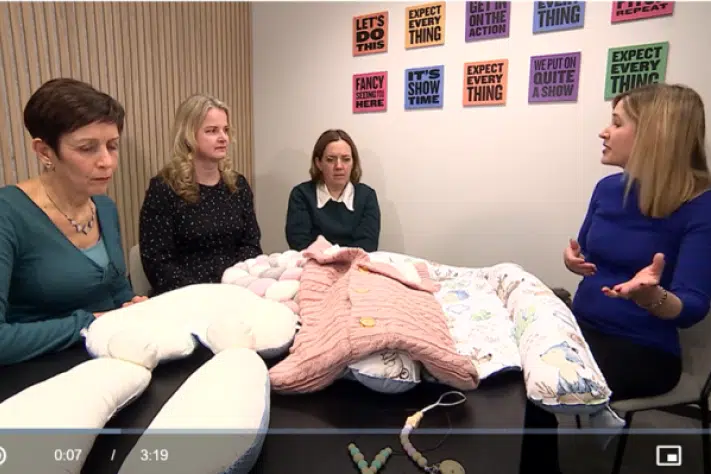Yesterday, health visiting featured in an exclusive ITV news story about potentially unsafe baby products. ITV News completed an investigation which found that items being sold online may pose a risk to babies.
You can watch the news piece and read the online story with extended interviews here.
The Institute of Health Visiting (iHV) supported ITV News with its investigation. We provided exclusive early access to data from our annual survey which highlighted health visitors’ concerns about the availability of these unsafe products in the UK. We asked health visitors across the country (n=1,186) to share their frontline practitioner intelligence on how widespread this problem is and their level of concern. Our findings were shared in the news item yesterday, aired at 6pm on ITV News Regions across the country:
- The majority of health visitors (88%) said they had come across parents using unsafe baby products.
- Nearly all health visitors (97%) said they are concerned about the availability of these products in the UK.
Georgina Mayes, iHV Policy and Quality Lead, joined an expert panel with Jenny Ward, Chief Executive of The Lullaby Trust, and Katrina Phillips OBE, Chief Executive the Child Accident Prevention Trust (CAPT). In the news piece, they aimed to raise awareness of potentially unsafe baby products and examined a range of products from sleep accessories to certain types of dummy clips and teethers. There were collective concerns from all panel members about the risks posed to babies from the products shared.
On reviewing the table of unsafe products, Katrina Phillips OBE, Chief Executive of CAPT described them as ‘potential tragedies waiting to happen’.
ITV News also shared Lisa Gee’s story. Lisa has been campaigning for ten years to raise awareness of the dangers of cot bumpers. Her son, Preston, tragically died when he was nine months old, linked to a baby cot bumper. Lisa shared how concerned she was by ITV’s findings which found that a range of products that are linked to increase risk of death and harm are still available to purchase in the UK. Lisa wants to prevent other families from facing similar tragedies and is keen to continue to raise awareness among parents.
The ITV News story was aired at a particularly important time of year, as many families are buying Christmas presents for their babies. These products may look appealing to families who are not aware that the dangers that they pose to babies. The news piece warns that positive reviews from consumers or promotion by celebrities does not mean that a product meets basic safety tests or is recommended to help create the safest sleep environment for a baby.
Following the ITV News investigation, two online marketplaces have now withdrawn items discussed during the panel but some of the other sellers and manufactures have chosen not to comment on ITV findings.
Katrina Phillips OBE, Chief Executive of CAPT, said:
“It’s hard enough being a new parent. Parents should be able to trust that the things they buy for their baby are safe – whether from sellers on online marketplaces or shops on their high street.
“In our recent research, three-quarters of parents thought that, if they were buying for their baby from an online marketplace, the product would have been fully tested and certified safe by an independent body before it could be sold online. That’s simply not the case.
“In reality, if an online seller is based overseas, and sells through an online platform, they can evade their safety responsibilities – even for nursery products for your baby. Check out our advice on how to choose safe sellers on online marketplaces.”
Jenny Ward, Chief Executive of The Lullaby Trust, said:
“With so many baby sleep products on the market, it can be hard for parents to know which products are right for their baby. Not every baby sleep product sold conforms to safer sleep advice and it’s vital that parents know what to look for. We strongly recommend parents ensure that any product they buy complies with British Standards and that they carefully follow all instructions included with the product.
“When choosing sleep items for a baby there are just a few key essentials parents need. To help with this, we have put together a useful guide on how to choose the products or items your baby needs: https://www.lullabytrust.org.uk/wp-content/uploads/The-Lullaby-Trust-Product-Guide-Web.pdf.”
Georgina Mayes, iHV Policy and Quality Lead, said:
“Parents just want to do the right thing for their baby. Clever online marketing and promotion of unsafe baby products, lures parents into a false sense of security, because the items are sold as ‘being able to make babies sleep better’. As an exhausted parent, who wouldn’t want their baby to sleep better? You can understand why parents buy these products.
“Our survey showed, when health visitors explain the risks posed to babies, parents are shocked that unsafe baby products are allowed to be sold online. Health visitors have a vital role in supporting families to access the right information on how to keep their baby safe. Just one conversation could prevent an accident or tragedy.”
Health visiting practitioners all play a crucial role in raising awareness of these potentially unsafe products and supporting parents through their work to reduce unintentional injuries. Please promote this story and the guidance on child safety through your networks.
For further advice and guidance on baby and child safety, visit:
We would like to say a huge heart felt thank you to all the health visitors, practitioners and families who shared their experiences so generously and enabled on location filming of this very important news story. We are particularly indebted to Lisa Gee who bravely shared her tragic personal story about her son Preston, in the hope that this will prevent further tragedies.
With special thanks to Jenny Ward, Chief Executive of The Lullaby Trust, and Katrina Phillips OBE, Chief Executive of CAPT, for their support and expert guidance with this news story.




